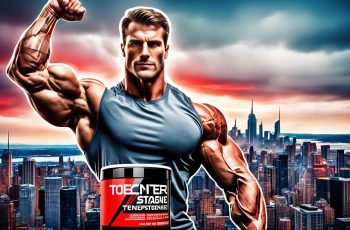Ad Blocker Detected
Our website is made possible by displaying online advertisements to our visitors. Please consider supporting us by disabling your ad blocker.
Are you curious about the effects of testosterone supplementation on men’s health? Many individuals wonder whether this approach is safe and beneficial. The article “Is testosterone supplementation healthy for men?” delves into this topic, exploring the potential advantages and risks associated with testosterone supplementation. By examining various studies and expert opinions, you will gain a better understanding of the impact it can have on men’s well-being. Whether you seek to optimize your performance, combat symptoms of low testosterone, or simply satisfy your curiosity, this article provides valuable insights into the world of testosterone supplementation.

This image is property of images.unsplash.com.
The Importance of Testosterone in Men’s Health
Understanding Testosterone and Its Functions
Testosterone is a hormone that plays a crucial role in men’s health. It is primarily produced in the testicles and is responsible for the development and maintenance of male characteristics. Apart from its role in sexual development, testosterone also influences various physiological functions such as muscle mass, bone density, mood regulation, and energy levels.
Effects of Low Testosterone Levels
When testosterone levels drop below normal, it can lead to a range of symptoms and health issues. Low testosterone, also known as hypogonadism, can cause decreased libido, erectile dysfunction, fatigue, reduced muscle mass and strength, increased body fat, and mood disturbances. It can also have an impact on cognitive function and bone health.
Common Symptoms of Low Testosterone
Recognizing the symptoms of low testosterone is crucial for early diagnosis and treatment. Some common symptoms include decreased sex drive, problems with erections, fatigue, reduced muscle mass, increased body fat, mood swings, irritability, and difficulty concentrating. If you experience any of these symptoms, it is important to consult with a healthcare professional to determine if low testosterone could be the cause.
Different Types of Testosterone Supplementation
Testosterone Replacement Therapy (TRT)
Testosterone Replacement Therapy (TRT) is a common method of testosterone supplementation. It involves the administration of testosterone in various forms, such as injections, gels, patches, or pellets, to restore testosterone levels to normal. TRT is typically recommended for men diagnosed with hypogonadism or low testosterone levels confirmed through blood tests.
Testosterone Boosters
Testosterone boosters are over-the-counter supplements that claim to naturally increase testosterone levels. They usually contain ingredients like herbs, vitamins, and minerals that are believed to enhance testosterone production or reduce its conversion to estrogen. However, the effectiveness of these supplements is still under debate, and their use should be approached with caution.
Anabolic Steroids
Anabolic steroids are synthetic forms of testosterone that are used to increase muscle mass, strength, and performance. However, the use of anabolic steroids for non-medical purposes is illegal and associated with various risks and side effects. They can disrupt the body’s natural hormone balance, increase the risk of cardiovascular issues, and have detrimental effects on psychological well-being.

This image is property of images.unsplash.com.
Benefits of Testosterone Supplementation
Increased Muscle Mass and Strength
One of the primary benefits of testosterone supplementation is its ability to increase muscle mass and strength. Testosterone plays a vital role in protein synthesis, the process by which new muscle tissue is built. By optimizing testosterone levels, individuals may experience enhanced muscle growth, improved athletic performance, and faster recovery from exercise.
Improved Sexual Function
Testosterone plays a crucial role in sexual health, including maintaining libido and supporting erectile function. Supplementing with testosterone can help restore sexual desire and improve erectile function in men with low testosterone levels. It can also lead to better sexual satisfaction and overall sexual well-being.
Enhanced Mood and Energy Levels
Testosterone levels also affect mood and energy levels. Low testosterone is often associated with fatigue, low motivation, irritability, and mood swings. By restoring testosterone levels to a healthy range, men may experience improved mood, increased energy levels, and a greater sense of well-being.
Risks and Side Effects of Testosterone Supplementation
Polycythemia and Increased Red Blood Cell Count
One potential risk of testosterone supplementation is the development of polycythemia, a condition characterized by an elevated red blood cell count. This can increase the risk of blood clot formation and may contribute to cardiovascular issues. Regular monitoring of blood parameters is crucial to ensure that testosterone therapy does not negatively impact blood health.
Prostate Health Issues
There is ongoing concern about the impact of testosterone supplementation on prostate health. Testosterone can stimulate the growth of both normal prostate cells and existing prostate cancer cells. While there is no definitive evidence linking testosterone therapy to prostate cancer, it is essential for men receiving testosterone supplementation to undergo regular prostate screenings to monitor any potential changes.
Negative Impact on Cardiovascular Health
Some research suggests that testosterone supplementation may increase the risk of cardiovascular issues, such as heart attacks and strokes, particularly in older men or those with pre-existing heart conditions. However, more studies are needed to fully understand the relationship between testosterone supplementation and cardiovascular health. It is important to discuss cardiovascular risks with a healthcare professional before starting testosterone therapy.

This image is property of images.unsplash.com.
Testosterone Supplementation and Ageing
Testosterone Levels Decline with Age
As men age, testosterone levels naturally decline. From the age of 30 onwards, testosterone levels gradually decrease by about 1% each year. This decline can result in various age-related changes, including decreased muscle mass, reduced bone density, increased body fat, and declines in sexual function and cognitive abilities.
Potential Benefits of Supplementation in Older Men
Testosterone supplementation may offer potential benefits for older men struggling with the effects of age-related testosterone decline. Studies have shown that testosterone therapy can help improve muscle mass, bone density, sexual function, mood, and cognitive function in older men with low testosterone levels, leading to an overall improvement in quality of life.
Considerations for Older Men
While testosterone supplementation may be beneficial for some older men, it is essential to evaluate the individual’s overall health and medical history before initiating therapy. Older men with pre-existing cardiovascular conditions or prostate issues may need careful monitoring and closer medical supervision. A healthcare professional can provide personalized advice based on individual circumstances.
Health Conditions That May Benefit from Testosterone Supplementation
Hypogonadism
Hypogonadism, a condition characterized by low testosterone levels, is the primary indication for testosterone supplementation. Men with diagnosed hypogonadism often experience a variety of symptoms related to low testosterone levels, including decreased libido, erectile dysfunction, fatigue, and reduced muscle mass. Testosterone replacement therapy can significantly improve these symptoms and restore testosterone levels to a healthy range.
Chronic Illnesses and Fatigue
Certain chronic illnesses can cause fatigue and decrease testosterone production. In some cases, testosterone supplementation may be beneficial in improving energy levels and overall well-being in individuals with chronic illnesses such as HIV/AIDS, kidney disease, or chronic obstructive pulmonary disease (COPD). However, the decision to use testosterone therapy in these situations should be made in consultation with a healthcare professional.
Osteoporosis
Low testosterone levels have been associated with an increased risk of osteoporosis, a condition characterized by weakened bones and an increased susceptibility to fractures. Testosterone supplementation can help improve bone density and reduce the risk of fractures in men with low testosterone and osteoporosis. However, other treatments specifically targeting osteoporosis may also be necessary.
Potential Risks and Considerations for Testosterone Supplementation
Dependency and Suppression of Natural Testosterone Production
One potential risk of testosterone supplementation is the potential for dependency and suppression of natural testosterone production. When external testosterone is introduced into the body, the testes may reduce or cease natural testosterone production. This can lead to testicular atrophy and a dependence on testosterone supplementation. Careful monitoring of hormone levels and dosages is critical to prevent long-term complications.
Monitoring Hormone Levels and Dosages
Regular monitoring of hormone levels and dosages is crucial when undergoing testosterone supplementation. Blood tests are used to assess testosterone levels, estrogen levels, and other health parameters. This monitoring helps ensure that testosterone levels remain within the therapeutic range and that no adverse effects or imbalances occur.
Individual Variations and Responsiveness
It is important to note that individuals may respond differently to testosterone supplementation. Factors such as genetics, overall health, lifestyle, and individual hormone profiles can influence the effectiveness and tolerability of testosterone therapy. Working closely with a healthcare professional allows for personalized monitoring and adjustments to optimize the benefits while minimizing potential risks.
Testosterone Supplementation and Athletic Performance
Controversy Surrounding the Use of Testosterone in Sports
The use of testosterone in sports is highly controversial and strictly regulated. Testosterone supplementation is considered performance-enhancing and is prohibited by most sporting organizations. Athletes testing positive for elevated testosterone levels may face severe consequences, including disqualification, loss of medals, and bans from competition.
Performance-Enhancing Effects of Testosterone
Testosterone has undeniable performance-enhancing effects, including increased muscle mass, strength, and endurance. Athletes who illegally use testosterone or other anabolic steroids may seek these performance benefits to gain a competitive edge. However, the use of these substances for non-medical purposes is unethical, unsafe, and against the rules set by sporting authorities.
Legal and Ethical Considerations
It is crucial for athletes to understand the legal and ethical implications of testosterone supplementation in sports. Rule violations can result in severe consequences and tarnish an athlete’s reputation. Instead, athletes should focus on natural, legal methods of improving performance, such as proper training, nutrition, rest, and optimized recovery strategies.
Alternatives to Testosterone Supplementation
Lifestyle Modifications and Natural Ways to Boost Testosterone
For individuals with mild testosterone deficiency or those looking to optimize their testosterone levels naturally, lifestyle modifications can play a significant role. Adequate sleep, regular exercise, stress management, and a healthy diet rich in essential nutrients such as zinc and vitamin D can help support testosterone production and overall hormonal balance.
Dietary Changes and Supplements
Certain dietary changes and nutritional supplements may also support testosterone production. Foods rich in zinc, such as oysters, lean meats, and nuts, can help boost testosterone levels. Additionally, supplements like D-aspartic acid, fenugreek, and vitamin D have shown some potential in supporting healthy testosterone levels. However, these supplements should be used with caution and under the guidance of a healthcare professional.
Exercise, Sleep, and Stress Management
Regular exercise, sufficient sleep, and effective stress management can have a positive impact on testosterone levels. Engaging in strength training exercises, getting an adequate amount of sleep, and adopting stress management techniques, such as mindfulness or relaxation exercises, can help optimize testosterone production and overall hormonal health.
What are the potential health risks and benefits of testosterone supplementation for men?
When considering the pros and cons of testosterone supplements for men, it’s important to understand the potential health risks and benefits. While these supplements can improve muscle mass and libido, they may also increase the risk of heart disease and prostate issues. It’s crucial to consult with a healthcare professional before starting any supplementation regimen.
Consulting a Healthcare Professional
Importance of Medical Advice and Supervision
When considering testosterone supplementation, it is essential to consult with a qualified healthcare professional specializing in hormonal health. They can assess your symptoms, perform the necessary blood tests, and provide personalized recommendations based on your individual needs. Medical supervision ensures that testosterone therapy is administered safely and that potential risks are minimized.
Personalized Approach to Testosterone Supplementation
Every individual’s testosterone supplementation needs may vary, and a personalized approach is vital. A healthcare professional will consider factors such as age, overall health, symptoms, and hormone levels to determine the appropriate method and dosage of testosterone supplementation. This individualized approach helps optimize treatment outcomes while minimizing risks and side effects.
Monitoring and Managing Side Effects
Regular monitoring and management of potential side effects are essential when undergoing testosterone supplementation. Healthcare professionals will closely monitor hormone levels, cardiovascular health, prostate health, and other relevant parameters to ensure the therapy is well-tolerated and safe. Open communication with your healthcare provider about any concerns or changes in symptoms is crucial for maintaining optimal health during testosterone supplementation.
In conclusion, testosterone plays a critical role in men’s health, influencing various aspects of physical and mental well-being. Testosterone supplementation, when used appropriately and under medical supervision, can help address low testosterone levels and improve quality of life. However, it is essential to consider the potential risks, individual variations, and ethical considerations associated with testosterone supplementation. Consulting with a healthcare professional is crucial to determine the best course of action and ensure personalized care throughout the process.



